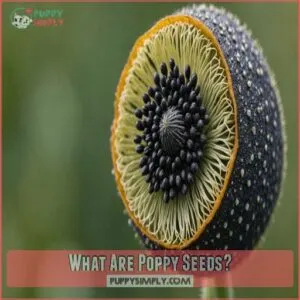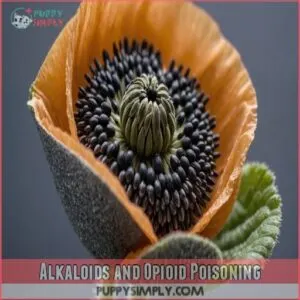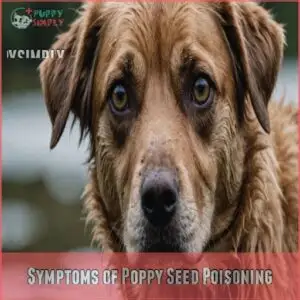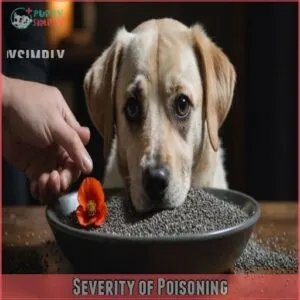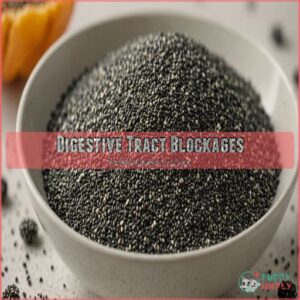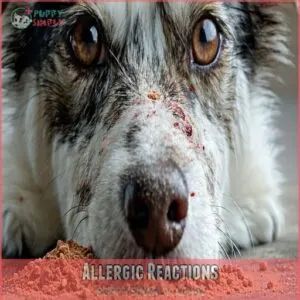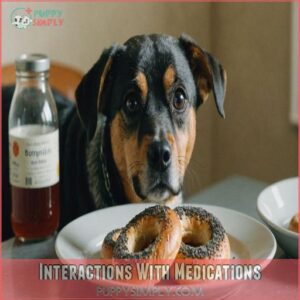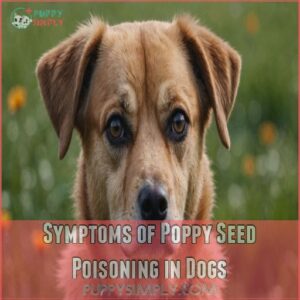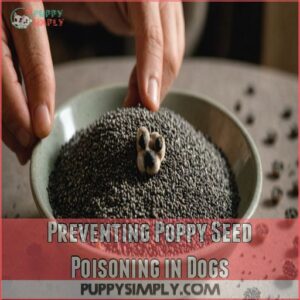This site is supported by our readers. We may earn a commission, at no cost to you, if you purchase through links.
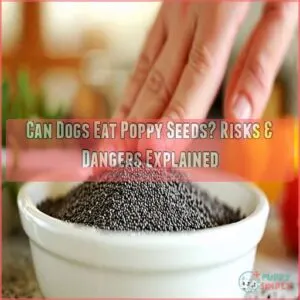 You might wonder if Fido can munch on your favorite poppyseed muffin, but beware—dogs shouldn’t eat poppyseed.
You might wonder if Fido can munch on your favorite poppyseed muffin, but beware—dogs shouldn’t eat poppyseed.
These tiny seeds can pack a punch for our four-legged pals, causing poppy toxicity.
Dogs can’t process them like we do, and the alkaloids in poppyseed can lead to serious health issues, from sluggishness to seizures.
Symptoms can vary, but it’s more than just a tummy ache.
So, keep those poppyseeds out of reach and opt for safer treats.
Want to find some dog-friendly options and learn what to do if they sneak a bite?
Stay tuned for tips and insights!
Table Of Contents
- Key Takeaways
- What Are Poppy Seeds?
- Toxicity of Poppy Seeds to Dogs
- Risks Associated With Poppy Seed Consumption
- Symptoms of Poppy Seed Poisoning in Dogs
- What to Do if Your Dog Eats Poppy Seeds
- Safe Alternatives to Poppy Seeds for Dogs
- Preventing Poppy Seed Poisoning in Dogs
- Frequently Asked Questions (FAQs)
- Can dogs eat poppy seeds?
- Can dogs eat poppy seed muffins?
- How many poppy seeds do you need for a dog?
- Can you eat poppy seeds whole?
- What happens if a dog eats poppy seeds?
- Can my dog have poppy seed muffin?
- Can my dog have poppy seed bread?
- Can dogs eat bagels with poppy seeds?
- How do poppy seeds affect dog medication?
- Are specific dog breeds more susceptible to poppy toxicity?
- Can a small amount of poppy seeds be safe?
- Do poppy seed bagels pose a risk to dogs?
- How long do poppy seeds stay in a dogs system?
- Conclusion
Key Takeaways
- Keep poppy seeds out of your dog’s reach because they contain alkaloids that can cause serious health issues like seizures and lethargy.
- If your dog eats poppy seeds, which can cause opioid poisoning risks, monitor them closely for symptoms such as weakness, depression, loss of appetite, constricted pupils, and difficulty breathing, and contact your vet immediately.
- Opt for safer treats like sesame seeds, chia seeds, or flaxseeds, as these offer nutritional benefits without the risk of toxicity.
- Educate yourself on toxic substances like xylitol found in common biscuit ingredients and dog-safe treats to prevent accidental ingestion and ensure your dog’s safety.
What Are Poppy Seeds?
Poppy seeds come from the opium poppy plant, known for its tiny blue-black seeds used in various foods.
You’ll find them adding a nutty flavor and crunch to baked goods like bagels and muffins.
Origin and Composition
Poppy seeds come from the opium poppy plant and have a unique seed structure. They’re tiny, and that’s no exaggeration! Despite their minuscule size, they pack a punch in flavor. Here’s a quick look:
- Opium poppy origin: Budding from history-rich plants.
- Processing methods: Cleaned to reduce alkaloid content.
- Seed structure: Miniscule but mighty.
Nutritional Value
You probably know poppy seeds are tiny, but they’re packed with nutrients.
They’ve a good mix of dietary fiber, calcium, magnesium, and manganese.
Poppy seeds have various uses, including being sold as products for poppy seed benefits.
Now, while these nutrients might make poppy seeds sound like a great addition to human diets, they’re NOT suitable for dogs due to potential toxicity and health risks.
Keep your furry pal safe!
Common Uses in Food
For a touch of flavor, poppy seeds sprinkle their way into many foods.
You’ll find them:
- Topping bagels and muffins for a crunchy twist.
- Swirled into breads like the classic lemon poppy seed loaf.
- Enhancing baked goods with a subtle nutty flavor.
- Decorating desserts for a bit of visual and taste appeal.
Balanced and tasty, aren’t they?
Toxicity of Poppy Seeds to Dogs
Poppy seeds, while seemingly harmless, contain small amounts of alkaloids that can be toxic to dogs if ingested in large quantities.
It’s best to keep poppy seeds away from your furry friend to avoid potential health problems.
Alkaloids and Opioid Poisoning
If you’re thinking about giving your dog poppy seeds, it’s important to be careful because alkaloids can cause opioid poisoning.
Dogs have a low tolerance, so even small amounts can be harmful.
Learn more about products for dog poppy seed poisoning to keep your pet safe.
Here’s a quick breakdown:
| Topic | Explanation |
|---|---|
| Poppy seed regulation | Poppy seeds in dog food are risky. |
| Opium poppy cultivation | Opium alkaloids pose dangers. |
| Alkaloid extraction | Trace alkaloids affect dogs. |
| Canine opioid tolerance | Dogs have low opioid tolerance. |
| Opioid poisoning treatment | Veterinary care is essential. |
Symptoms of Poppy Seed Poisoning
Spotting symptoms of poppy seed poisoning in your dog isn’t a walk in the park.
Imagine your furry friend suddenly showing lethargy or confusion.
Symptoms might also include respiratory depression, vomiting, or diarrhea.
It’s like an unforeseen storm cloud on a sunny day.
Keep a watchful eye, as these signs could indicate your dog needs immediate vet attention.
Severity of Poisoning
In the mesmerizing world of poppy seeds and dogs, the severity of poisoning hinges on a few key factors. Think about:
- Amount ingested: A sprinkle or a handful?
- Dog size: Tiny terriers or bulky bulldogs?
- Breed susceptibility: Some breeds are more fragile.
- Individual sensitivity: Just like Aunt Mildred’s peanut allergy, every dog is unique.
Keep these in mind to safeguard your furry friend.
Risks Associated With Poppy Seed Consumption
When your dog munches on poppy seeds, they risk serious digestive issues, allergies, and medication interactions. It’s best to steer clear to keep your furry friend safe and healthy.
Digestive Tract Blockages
Poppy seeds might be tiny, but they can become a big problem if they block a dog’s digestive tract.
Picture your pup struggling with discomfort—no fun!
Watch for signs like vomiting or lack of appetite.
Different dog breeds could face varying risks.
Here’s a quick rundown:
| Poppy Seed Size | Blockage Prevention | Symptoms | Treatment Options |
|---|---|---|---|
| Tiny | Keep out of reach | Vomiting, distress | Veterinary care |
| Small | Use safe treats | Appetite loss | Surgery if needed |
Allergic Reactions
You might think only blockages cause trouble, but poppy seed allergies pose a risk too.
Watch out for symptoms like itching, swelling, or breathing issues.
Some dog breeds might be more susceptible due to cross-reactivity.
Keep a list of symptoms handy to catch reactions early.
- Poppy seed allergies: Risky for dogs
- Dog breed susceptibility: Varies
- Symptoms to watch for: Allergic reactions
Interactions With Medications
A few poppy seeds probably won’t hurt, but some meds and poppy seeds don’t mix.
The tiny amount of opium in poppy seeds could interact with certain medications.
This is why it’s best to avoid giving your dog anything with poppy seeds.
If you’re unsure, always check with your vet.
Medication safety is key, especially for our furry friends!
A quick vet consultation can prevent potential problems.
Symptoms of Poppy Seed Poisoning in Dogs
If your dog munches on poppy seeds, it’s important to watch for symptoms like breathing difficulties and decreased heart rate.
These signs, along with hyperactivity, loss of coordination, seizures, or even coma, mean you should contact your vet right away.
Breathing Difficulties
Imagine your dog struggling for breath, just like a car sputtering to start on a cold morning.
Poppy seed poisoning can cause respiratory distress, so keep a keen eye for:
- Wheezing or coughing
- Shortness of breath
- Rapid, shallow breathing
If these pop up, it’s essential to contact your vet. Your furry friend needs help before things go south.
Decreased Heart Rate
Breathing troubles can also lead to a decreased heart rate in dogs.
When their pulse slows down, it may feel like a sluggish symphony inside them, muddying the beat.
Stress impacts this greatly, especially in sensitive dog breeds.
Medications for underlying conditions might mask this effect, which is why keeping a keen eye on their rhythm is key.
| Symptoms | Dog Breeds Affected | Possible Causes |
|---|---|---|
| Slow Heart Rate | Small Breeds | Stress Impact |
| Irregular Pulse | Large Breeds | Medication Effects |
| Weak Pulse | Any Breed | Underlying Conditions |
| Fatigue | Brachycephalic | Heart Health |
| Lethargy | Older Dogs | Opioid Poisoning |
Hyperactivity and Loss of Coordination
When poppy seed poisoning hits, dog behavior changes become a swirling storm.
Your once calm pup may suddenly act like it’s had too much caffeine – hyperactive and bouncing off the walls.
This neurological effect from opioid toxicity can also muddle their coordination, making them stagger like they’re on a bumpy ride.
Swift veterinary care can smoothen the rough patch.
Seizures and Coma
Seizures can emerge from poppy seed poisoning, leaving your furry friend disoriented.
It’s like a storm brewing out of nowhere, leading to a potential coma.
This risk highlights the need for prevention and treatment in safeguarding your dog.
Pay attention to causes and risk factors to help a swift recovery.
Always keep poppy seeds out of reach.
What to Do if Your Dog Eats Poppy Seeds
If your dog munches on poppy seeds, don’t panic, but take action quickly and contact your veterinarian for advice.
Keep a close eye on your furry friend for any signs of distress or unusual behavior.
Monitoring for Symptoms
After seeing those scary symptoms, keep a close eye on your pup.
Note any changes in their behavior; even small things matter.
How long have these symptoms been going on?
The severity of symptoms and the timeframe are key.
Watch for subtle signs like lethargy or unusual thirst.
Recognizing these early warning signs can make all the difference.
Don’t panic, but stay alert.
Your careful observation is the first step.
Contacting Your Veterinarian
If your dog shows poisoning symptoms after nibbling on poppy seeds, reach out to your veterinarian for urgent care.
Don’t guess; veterinary advice is key.
They know the best treatment options and prevention tips.
Plus, contacting a vet helps you regain control of the situation, ensuring your furry friend stays on the path to safety and health.
Treatment and Care
You’ve spoken to your vet about the poppy seed incident, and now it’s time for treatment and care.
Your pup might need emergency care, fluid therapy, or medication, so follow your vet’s advice closely.
It’s important to act fast, as induced vomiting may be recommended to counter the effects of opium poppy toxicity.
At home, keep them comfy and hydrated.
This situation’s a wake-up call to dog-proof your kitchen, after all, prevention beats cure!
Safe Alternatives to Poppy Seeds for Dogs
If you’re looking for safe alternatives to poppy seeds for your dog, consider sesame seeds, chia seeds, and flaxseeds.
Pumpkin seeds, chia seeds, and flaxseeds, which are seeds safe for pets, These options are safe but also add some extra nutrition to your pet’s diet.
Sesame Seeds
When your dog sneaks a few poppy seeds, it’s hard not to panic.
Thankfully, sesame seeds are a safer choice.
They pack benefits like vitamins and fiber without the risk.
You can even find various products like sesame seed oil online at sesame seed oil shops.
It adds flavor to many recipes.
And unlike poppies, there’s no history of sesame seeds causing allergic reactions in dogs.
Chia Seeds
Chia seeds are a great alternative for dogs—packed with omega-3s, fiber, and protein.
They’re tiny but mighty, just like a superhero in seed form.
Since chia seeds provide similar nutritional benefits without the risks associated with poppy seeds, such as morphine and codeine toxicity, they’re an excellent addition to dog food.
Toss them into dog food for a health boost, but keep an eye out for allergies.
Start small and watch for any reactions.
Simple chia seed recipes can add variety safely.
Flaxseeds
Curious about flaxseeds for your furry friend?
Flaxseeds are a safe and nutritious alternative to poppy seeds.
They’re packed with omega-3s, which are great for your dog’s coat and immune system.
Unlike poppy seeds, flaxseeds don’t pose a toxicity risk.
Always introduce them gradually to avoid allergies, and sprinkle them in small amounts over your dog’s meals.
Preventing Poppy Seed Poisoning in Dogs
Preventing poppy seed poisoning is simple: keep poppy seeds out of your dog’s reach. This includes being mindful of your baking and storing food safely, ensuring your furry friend’s well-being.
Keeping Poppy Seeds Out of Reach
Prevent poppy mishaps by using smart storage solutions.
Keep seeds in sealed containers out of Fido’s reach.
You should know that even small amounts of poppy seeds can cause toxic symptoms in dogs.
Dog-proofing kitchens helps with safe food prep.
Just as with child safety, stash poppy seeds high up.
Consider pet-friendly recipes that avoid risky ingredients altogether.
Your canine companion deserves a worry-free environment where curiosity doesn’t lead to trouble.
Choosing Safe Dog Treats
When picking safe treats for your dog, focus on quality.
Choose products with simple, recognizable ingredients.
Here’s a quick list to keep things straightforward:
- Check labels for natural ingredients.
- Avoid brands with artificial additives.
- Consider homemade treats for control over ingredients.
- Match treats to specific needs, like dental care or sensitive stomachs.
These steps help guarantee your dog’s snacks are safe and tasty!
Educating Yourself on Toxic Substances
Ever thought your spice rack might be a hidden danger zone?
Discovering what’s hazardous for dogs is like detective work.
Safe pet foods are key, so check out lists of common household toxins and a toxic plant list.
Arm yourself with pet poison control numbers and brush up on pet first aid skills.
Your pup’s safety deserves the effort!
Frequently Asked Questions (FAQs)
Can dogs eat poppy seeds?
Dogs shouldn’t eat poppy seeds.
These little seeds can pose a risk, causing anything from tummy troubles to more serious nerve issues.
It’s best to keep poppy seed treats to yourself and choose safer snacks for them.
Can dogs eat poppy seed muffins?
No, poppy seed muffins aren’t safe for your furry friend.
Even small amounts of poppy seeds can upset their tummy or worse.
Stick to dog-friendly treats to keep them happy and healthy!
How many poppy seeds do you need for a dog?
Imagine poppy seeds are like tiny landmines for your dog.
Even a small amount can cause serious harm, so there’s no safe number.
It’s best to keep all poppy seeds away from their curious paws.
Can you eat poppy seeds whole?
You can definitely eat poppy seeds whole.
They’re commonly used in baking and cooking, adding a nutty flavor and crunch.
Be mindful, though, consuming them in large quantities might cause false positives in drug tests.
What happens if a dog eats poppy seeds?
Feeding poppy seeds to dogs can lead to symptoms like confusion, lethargy, or even seizures.
They contain alkaloids affecting a dog’s central nervous system.
Always keep poppy seeds away from your furry friends to avoid potential harm.
Can my dog have poppy seed muffin?
It’s best to avoid giving your dog a poppy seed muffin.
Poppy seeds can be toxic to dogs, and even small amounts might cause health issues.
Stick to dog-friendly treats designed to be safe and nutritious.
Can my dog have poppy seed bread?
Think of poppy seeds like hidden landmines for your dog.
Even a small amount in poppy seed bread can lead to serious health issues, like opioid poisoning.
It’s best to play it safe and avoid them entirely.
Can dogs eat bagels with poppy seeds?
Dogs shouldn’t eat bagels with poppy seeds.
Poppy seeds could be toxic and cause serious problems like lethargy and confusion.
It’s better to stick with safer treats designed for dogs and keep those bagels out of reach!
How do poppy seeds affect dog medication?
Poppy seeds contain trace amounts of opium.
This could interact with some dog medications, potentially altering their effectiveness or causing unexpected side effects.
Always consult your vet before giving your dog anything new.
Safety first!
Are specific dog breeds more susceptible to poppy toxicity?
No specific dog breeds are more susceptible to poppy toxicity.
All breeds can be affected by the toxic substances in poppy seeds.
Keep poppy seeds and related foods out of reach to protect your dog’s safety.
Can a small amount of poppy seeds be safe?
Imagine your dog eyeing a muffin that fell.
Even tiny amounts of poppy seeds can be risky.
Symptoms like confusion or breathing issues might arise.
Always play it safe—skip the seeds and use dog-friendly treats instead.
Do poppy seed bagels pose a risk to dogs?
Even a simple poppy seed bagel isn’t safe for your dog.
The seeds can be toxic in large amounts and might cause symptoms like lethargy or confusion.
Keeping baked treats away from dogs is your safest bet.
How long do poppy seeds stay in a dogs system?
A single poppy seed bagel can result in a failed drug test due to opiate traces.
Likewise, poppy seeds can linger in your dog’s system for up to 48 hours.
Always consult a vet if ingestion occurs.
Conclusion
Avoiding poppyseed treats is essential for your dog’s safety.
While poppyseeds might seem harmless, they pose serious risks like poppy toxicity, sluggishness, and seizures.
By understanding the dangers and symptoms, you’re better equipped to protect your furry friend.
If your dog does consume poppyseeds, prompt action is key—monitor for symptoms and contact your vet immediately.
Stick to safe rewards like sesame seeds or chia seeds to keep your dog happy and healthy.

